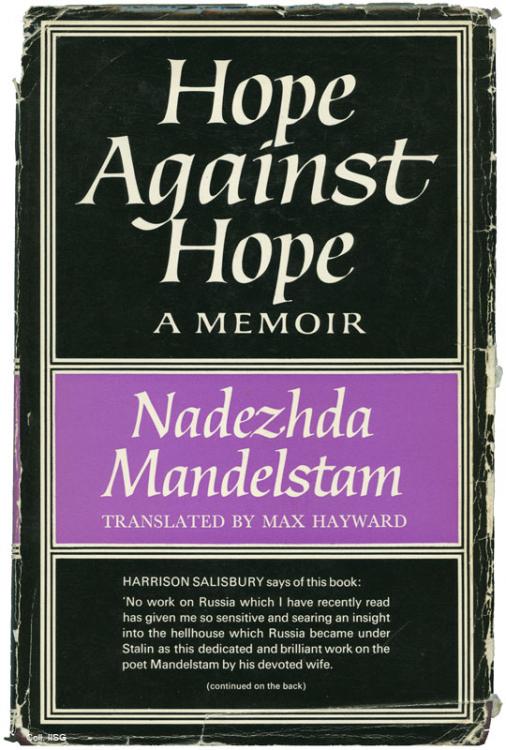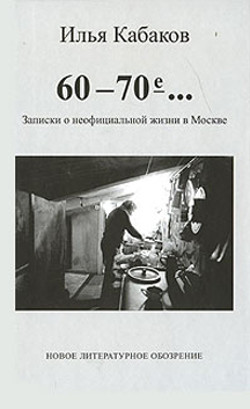Nadezhda Mandelstam: Hope Against Hope: A Memoir (1970) [RU, EN]
Filed under book | Tags: · 1930s, avant-garde, biography, history, history of literature, literature, memory, poetry, politics, russia, soviet union, totalitarianism

“Nadezhda Mandelstam’s memoir of her life with poet Osip, who was first arrested in 1934 and died in Stalin’s Great Purge of 1937-38. The book is a vital eyewitness account of Stalin’s Soviet Union and one of the greatest testaments to the value of literature and imaginative freedom ever written.”
Publisher Chekhov Publishing Corp., New York, 1970
432 pages
English edition
Translated by Max Hayward
With an Introduction by Clarence Brown
Publisher Atheneum, New York, 1970
Fifth printing, 1983
ISBN 0689705301
xvi+432 pages
Reviews: George Ivask (Slavic Review, 1971), Simon Karlinsky (Slavic and East European Journal, 1971), Robert P. Hughes (Russian Review, 1971), Seamus Heaney (London Review of Books, 1981), Elaine Feinstein (The Independent, 2013).
Commentary: Judith Robey (Slavic and East European Journal, 1998).
Vospominaniya (Russian, 1970/1999, TXT; HTML)
Hope Against Hope (English, 1970/1983, PDF/42 MB; DJVU/7 MB)
Aleksandar Bošković: Photopoetry and the Bioscopic Book: Russian and Czech Avant-Garde Experiments of the 1920s (2013)
Filed under thesis | Tags: · art, art history, avant-garde, book, constructivism, montage, photomontage, poetry, technology, typography, visual poetry

The extraordinary junction between poetry, photography and photomontage — photopoetry — flourished in avant-garde books and journals throughout Europe in the 1920s and 1930s. The new genre aspired to appropriate the products of technological culture in creating poetry more alert to the mass sensibility of a rapidly changing mechanical age. As a new hybrid form that combines poetic text and photographic images, it was ripe for poetic experimentation and production of optical provocations.
This dissertation focuses on three avant-garde photo-poetry books — Mayakovsky and Rodchenko’s About This (1923), Nezval and Teige’s Alphabet (1926), and Mayakovsky and Rozhkov’s unpublished and little known To the Workers of Kursk (1924-7) — examining them from the angle of the bioscopic book, a concept envisaged in a programmatic manner by El Lissitzky in 1923. (from the Abstract)
Dissertation
Slavic Languages and Literatures, University of Michigan, 2013
309 pages
PDF, PDF (9 MB, updated on 2020-7-23)
See also Mayakovsky and Rozhkov’s book in PDF (3 MB, via vk.com). Commentary: Bošković (2017).
Comment (0)Ilya Kabakov: The 1960s and 1970s: Notes on Unofficial Life in Moscow (1999) [RU, EN]
Filed under book | Tags: · 1960s, 1970s, aesthetics, art, biography, conceptual art, politics, russia, soviet union

A memoir, originally written in 1982 and 1986, by the Russian conceptual artist now living in the United States. “He belongs to the generation of underground (or nonconformist) artists that emerged with the liberalization of domestic policies in the Soviet Union in the 1960s during the Krushchev “thaw”. That generation formed a subculture in resistance to the ideological settings of “official art”, of Socialist Realism, as well as to Soviet ideology and the life style of ‘homo sovieticus’. This book is a memoir of the ‘underground years’ and offers a unique insider’s perspective on artistic life during a period of ‘prohibition’ through an exploration of the tension between totalitarian politics and resistance aesthetics.” (from a review by Volha Isakava)
60-е-70-е. записки о неофициальной жизни в Москве
Publisher Gesellschaft zur Förderung Slawistischer Studien, Vienna, 1999
Wiener Slawistischer Almanach. Sonderbände, 47
Digital edition by Otto Sagner, Munich, 2012
ISBN 9783954796380
267 pages
Conversation with Ilya and Emilia Kabakov (Anton Vidokle, e-flux, 2012, EN)
Reviews: Volha Isakava (Canadian Slavonic Papers, 2005, EN), Julianne Fürst (Kritika, 2013, EN).
Commentary: Keti Chukhrov (2010, EN).
JPGs, PDF (RU)
PDF (8 MB, RU)
Short excerpt in English translation

